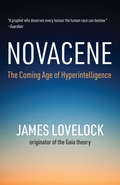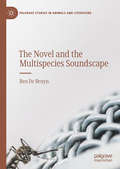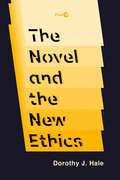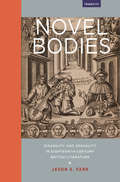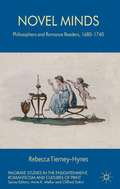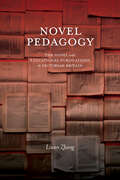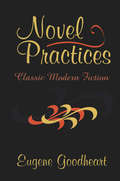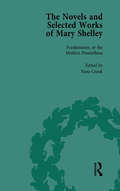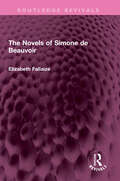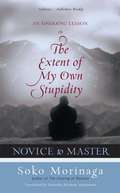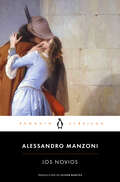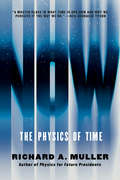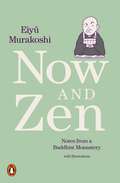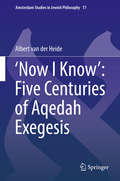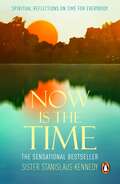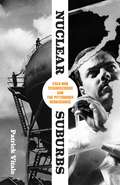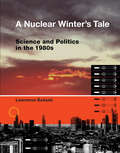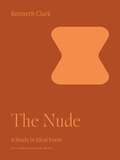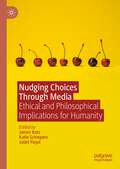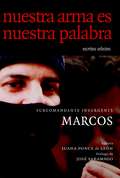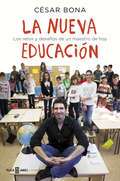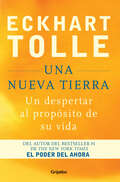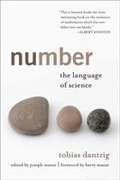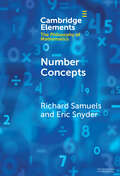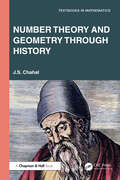- Table View
- List View
Novacene: The Coming Age of Hyperintelligence (The\mit Press Ser.)
by James LovelockThe originator of the Gaia theory offers the vision of a future epoch in which humans and artificial intelligence together will help the Earth survive.James Lovelock, creator of the Gaia hypothesis and the greatest environmental thinker of our time, has produced an astounding new theory about future of life on Earth. He argues that the Anthropocene—the age in which humans acquired planetary-scale technologies—is, after 300 years, coming to an end. A new age—the Novacene—has already begun.In the Novacene, new beings will emerge from existing artificial intelligence systems. They will think 10,000 times faster than we do and they will regard us as we now regard plants. But this will not be the cruel, violent machine takeover of the planet imagined by science fiction. These hyperintelligent beings will be as dependent on the health of the planet as we are. They will need the planetary cooling system of Gaia to defend them from the increasing heat of the sun as much as we do. And Gaia depends on organic life. We will be partners in this project.It is crucial, Lovelock argues, that the intelligence of Earth survives and prospers. He does not think there are intelligent aliens, so we are the only beings capable of understanding the cosmos. Perhaps, he speculates, the Novacene could even be the beginning of a process that will finally lead to intelligence suffusing the entire cosmos. At the age of 100, James Lovelock has produced the most important and compelling work of his life.
The Novel and the Multispecies Soundscape (Palgrave Studies in Animals and Literature)
by Ben De BruynThe contemporary novel is not as silent as we tend to believe, nor does it only attend to human plots and characters. As this book shows, writers in a range of subgenres have devoted considerable attention to the voices of nonhuman animals, and to the histories and technologies of listening that shape twenty-first-century cultures and environments. In doing so, their multispecies novels illuminate the cultural meanings we attach to creatures like dogs, frogs, whales, chimpanzees, and Tasmanian tigers – not to mention various bird species and even plants. At the same time, these stories explore the attitudes of distinct communities of human listeners, ranging from vets and musicians to chimp caretakers and sonar technicians. In highlighting animal sounds and their cultural meanings, these novels by authors including Amitav Ghosh, Julia Leigh, Richard Powers, Karen Joy Fowler, Cormac McCarthy, and Han Kang also enrich pressing debates about species extinction, sound pollution, nonhuman communication, and human-animal relations. As we are violently reshaping the planet, they invite us to reimagine our own humanity and animality – and to rethink how we tell stories about multispecies contact zones and their complex soundscapes.
The Novel and the New Ethics (Post*45)
by Dorothy J. HaleFor a generation of contemporary Anglo-American novelists, the question "Why write?" has been answered with a renewed will to believe in the ethical value of literature. Dissatisfied with postmodernist parody and pastiche, a broad array of novelist-critics—including J.M. Coetzee, Toni Morrison, Zadie Smith, Gish Jen, Ian McEwan, and Jonathan Franzen—champion the novel as the literary genre most qualified to illuminate individual ethical action and decision-making within complex and diverse social worlds. Key to this contemporary vision of the novel's ethical power is the task of knowing and being responsible to people different from oneself, and so thoroughly have contemporary novelists devoted themselves to the ethics of otherness, that this ethics frequently sets the terms for plot, characterization, and theme. In The Novel and the New Ethics, literary critic Dorothy J. Hale investigates how the contemporary emphasis on literature's social relevance sparks a new ethical description of the novel's social value that is in fact rooted in the modernist notion of narrative form. This "new" ethics of the contemporary moment has its origin in the "new" idea of novelistic form that Henry James inaugurated and which was consolidated through the modernist narrative experiments and was developed over the course of the twentieth century. In Hale's reading, the art of the novel becomes defined with increasing explicitness as an aesthetics of alterity made visible as a formalist ethics. In fact, it is this commitment to otherness as a narrative act which has conferred on the genre an artistic intensity and richness that extends to the novel's every word.
Novel Bodies: Disability and Sexuality in Eighteenth-Century British Literature (Transits: Literature, Thought & Culture 1650-1850)
by Jason S. FarrNovel Bodies examines how disability shapes the British literary history of sexuality. Jason Farr shows that various eighteenth-century novelists represent disability and sexuality in flexible ways to reconfigure the political and social landscapes of eighteenth-century Britain. In imagining the lived experience of disability as analogous to—and as informed by—queer genders and sexualities, the authors featured in Novel Bodies expose emerging ideas of able-bodiedness and heterosexuality as interconnected systems that sustain dominant models of courtship, reproduction, and degeneracy. Further, Farr argues that they use intersections of disability and queerness to stage an array of contemporaneous debates covering topics as wide-ranging as education, feminism, domesticity, medicine, and plantation life. In his close attention to the fiction of Eliza Haywood, Samuel Richardson, Sarah Scott, Maria Edgeworth, and Frances Burney, Farr demonstrates that disabled and queer characters inhabit strict social orders in unconventional ways, and thus opened up new avenues of expression for readers from the eighteenth century forward. Published by Bucknell University Press. Distributed worldwide by Rutgers University Press.
Novel Minds
by Rebecca Tierney-HynesEighteenth-century philosophy owes much to the early novel. Using the figure of the romance reader this book tells a new story of eighteenth-century reading. The impressionable mind and mutable identity of the romance reader haunt eighteenth-century definitions of the self, and the seductions of fiction insist on making an appearance in philosophy.
Novel Pedagogy: The Novel and Educational Publications in Victorian Britain (SUNY series, Studies in the Long Nineteenth Century)
by Liwen ZhangIs the novel a category of knowledge that merits serious study? Even if the novel has shed the stigma of being mindless entertainment, one might easily assume that reading a novel is not "studying," unless one reads closely and carefully, preferably from a scholarly edition or for a scholarly purpose. Novel Pedagogy explores how Victorian writers envisioned the novel's potential to become knowledge long before the form’s ascendence into the ivory tower. Liwen Zhang argues that Victorian novelists' constant critique of schooling, on the one hand, and their frequent invocation of deep knowledge, on the other, are not self-contradictory. Instead of offering a blissful escape from education, writers such as William Thackeray, Charles Kingsley, Charles Dickens, Elizabeth Gaskell, George Eliot, and George Gissing seek to offer uniquely novelistic pathways to knowledge. Novel Pedagogy offers a new model of novelistic epistemology by showing how the novel, unlike other educational genres, reflects on the unpleasant realities of learning—and of not learning—amid the ubiquity of ineffective textbooks, reluctant students, and false motivations.
Novel Practices: Classic Modern Fiction
by Eugene GoodheartAn important debate in modern literary criticism concerns the exact relationship between the ancient epic and the novel. Both the epic and the most ambitious modern novels are large-scale attempts to present a comprehensive view of the world through the experience of a representative hero. However, in the older tradition the hero stood for the aspirations and highest ideals of his society. The protagonist of the modern novel is usually at odds with that society, whether as exile, active rebel, or antagonistic critic. In Novel Practices, the distinguished literary scholar Eugene Goodheart surveys a representative selection of modern novelists tracing how the epic impulse has been reshaped under the conditions of modernity.
The Novels and Selected Works of Mary Shelley Vol 1
by Nora Crook Pamela Clemit Betty T BennettThese eight volumes contain the works of Mary Shelley and include introductions and prefatory notes to each volume. Included in this edition are "Frankenstein" (1818), "Matilda" ((1819), "Valperga" (1823), "The Last Man" (1826), "Perkin Warbeck" (1830) and "Lodore" (1835).
The Novels of Simone de Beauvoir (Routledge Revivals)
by Elizabeth FallaizeFirst published in 1988, The Novels of Simone de Beauvoir concentrates specifically on the novels of the famous 20th Century French writer, Simone de Beauvoir. Her novels are popular with both the students and general readers of literature and philosophy, and they will welcome this authoritative introduction to Beauvoir’s fiction. The author examines Beauvoir’s choice of narrative strategies and interprets them both in relation to the sexual politics of writing and in relation to the place which the constraints of history, class and gender increasingly play in the texts. All quotations are translated.
Novice to Master
by Soko Morinaga Belenda Attaway YamakawaEverybody loves Novice to Master! As you'll see in the glowing endorsements and reviews included below, this modern spiritual classic has been embraced by readers of all types. In his singularly humorous and biitingly direct way, Zen abbot Soko Morinaga tells the story of his rigorous training at a Japanese Zen temple, his spiritual growth and his interactions with his students and others. Morinaga's voice is uniquely tuned to the truth of the condition of the human mind and spirit and his reflections and interpretations are unvarnished and succinct. His great gift is the ability to lift the spirit of the reader all the while exposing the humility and weakness in the lives of people, none more so than his own. Read on to see what everyone from Publishers Weekly to well-known Buddhist figures and even New York Times bestselling author Anthony Swofford have to say about this one of a kind book!
Los novios
by Alessandro ManzoniLa novela más importante de la literatura italiana moderna en una versión castellana insuperable Prólogo de Francesco Luti Traducción de Esther Benítez Enmarcada en la ocupación española de Lombardía durante el siglo XVII, Los novios cuenta la historia de Lucía y Renzo, dos enamorados de origen campesino que se ven cruelmente separados y que, en sus intentos por reunirse, se enfrentarán a los peligros e iniquidades de una época despiadada. Con temas como el amor, la fe y el poder, la obra perdura no solo como la más importante de Alessandro Manzoni, sino como el primer y mejor ejemplo de la novela italiana moderna. Nuestra edición ofrece un lúcido prólogo de Francesco Luti, profesor de la Universidad Autónoma de Barcelona, y recupera la aclamada traducción de Esther Benítez, que acerca toda la fuerza del original a los lectores hispanohablantes. La crítica ha dicho:«El clásico literario italiano del siglo XIX conocido por sus vívidas descripciones de la peste de 1630 que destruyó Milán». The New York Times «Los novios está entre las mejores novelas que se han escrito. Es perfecta en el interés de la trama, en la documentación histórica, en la frescura de los personajes, en la soltura de los diálogos, en los cambios de ritmo, en los desenlaces, en la habilidad para penetrar los secretos de los corazones».Rafael Gómez Pérez, aceprensa.org «La obra más importante del escritor italiano Alessandro Manzoni. El libro es el primer exponente de la novela italiana moderna y con la Divina comedia de Dante Alighieri es considerada la obra de la literatura italiana más importante y estudiada en las escuelas italianas».Lecturalia
Now: The Physics of Time
by Richard A. Muller“Now” is a simple yet elusive concept. You are reading the word “now” right now. But what does that mean? What makes the ephemeral moment “now” so special? Its enigmatic character has bedeviled philosophers, priests, and modern-day physicists from Augustine to Einstein and beyond. Einstein showed that the flow of time is affected by both velocity and gravity, yet he despaired at his failure to explain the meaning of “now.” Equally puzzling: why does time flow? Some physicists have given up trying to understand, and call the flow of time an illusion, but the eminent experimentalist physicist Richard A. Muller protests. He says physics should explain reality, not deny it. In Now, Muller does more than poke holes in past ideas; he crafts his own revolutionary theory, one that makes testable predictions. He begins by laying out—with the refreshing clarity that made Physics for Future Presidents so successful—a firm and remarkably clear explanation of the physics building blocks of his theory: relativity, entropy, entanglement, antimatter, and the Big Bang. With the stage then set, he reveals a startling way forward. Muller points out that the standard Big Bang theory explains the ongoing expansion of the universe as the continuous creation of new space. He argues that time is also expanding and that the leading edge of the new time is what we experience as “now.” This thought-provoking vision has remarkable implications for some of our biggest questions, not only in physics but also in philosophy—including the ongoing debate about the reality of free will. Moreover, his theory is testable. Muller’s monumental work will spark major debate about the most fundamental assumptions of our universe, and may crack one of physics’s longest-standing enigmas.
Now and Zen: Notes from a Buddhist Monastery: with Illustrations
by Eiyû Murakoshi'In Japan we have an expression, 'Float like Cloud, Flow like Water'. Its meaning is: to live free and unconstrained'In this short introduction to Zen Buddhism, a practising Japanese monk shares the many lessons he has learned from life inside a temple.With charm and humour, he guides us through everything from meditation to tea-drinking ceremonies, the meaning of koans to preparing Zen food. Accompanied by the author's own illustrations, this book invites you to change your perception through the wisdom of monastic life.
‘Now I Know’: Five Centuries of Aqedah Exegesis
by Albert van der HeideThis book describes how medieval Jewish Bible scholars sought to answer the question of what is meant by the Angel’s message from God to Abraham: ‘Now I Know’, as written in Genesis 22 verse 12. It examines these scholars’ comments on the nineteen verses in Genesis that tell the story of Abraham’s readiness to sacrifice his own son Isaac, the Aqedat Yiṣḥaq. It explores the answers they found to the question of what, indeed, this story is trying to tell us. Is it a drastic way to condemn the practice of child sacrifice? Does it call for replacing human sacrifices with animal sacrifices? Is it a trial by which the Almighty tests the fidelity of one of His followers? Or is it His way to show the world the nature of true belief?The book starts with an introduction to familiarize readers with the many and varied manifestations of the Aqedah theme in Jewish culture and with the developments of medieval Jewish Bible exegesis in general. Next, it offers translations and analyses of the classical medieval Jewish Bible commentaries that deal with the exegesis of Genesis 22, exploring the many angles from which the Aqedah story has been understood. No less than five centuries of medieval Aqedah exegesis are reviewed, from Saadya (882-942) to Isaac Abrabanel (1437-1508). These texts from the commentaries are combined with hermeneutical key passages by Moses Maimonides, Joseph Ibn Kaspi, Ḥasdai Crescas, and others, which were familiar to the minds of the exegetes, or which, conversely, reflect the impact of biblical Aqedah exegesis on religious thought. Together, the passages discussed illustrate the growth and development of Jewish Bible exegesis in dialogue with the rabbinic sources and with the various trends of thought and theology of their times. The consistent focus on the Aqedah constitutes a unifying theme, while the insights presented here greatly advance our understanding of the various developments in medieval Jewish Bible exegesis.
Now is the Time: the phenomenal instant bestseller perfect for anyone searching for a deeper meaning to life
by Stanislaus Kennedy"Take time to live - it's what life is for."This is an inspiring and thought-provoking work of vision from multi-bestseller Sister Stanislaus Kennedy. A timely and prescient collection of thoughts and reflections, with one central message: we have the time, if we make the choice to take time...'Even the most convinced cynics will find something in Sister Stan's basic premise' -- Ireland on Sunday'Very beautifully written' -- ***** Reader review'A book I want to read & reread in order to plumb its depths' -- ***** Reader review*************************************************************SPIRITUAL REFLECTIONS ON TIME FOR EVERYBODYNow is the Time looks beyond the boundaries of any one faith or church and draws on the great spiritual and philosophical traditions of east and west.As Sister Stan focuses on a line of poetry from one of the world's great authors, an idea from a psychotherapist or philosopher, or a proverb from oriental wisdom, she weaves her own thoughts around them in a way that presents them afresh, and allows us to see them from a new perspective.This is book for everyone battling with today's current climate: young or old, male or female, for the converted, the irreligious or plain disaffected.Reflective, contemplative and spiritual, it is the perfect tonic to our busy and relentless world...
Nuclear Suburbs: Cold War Technoscience and the Pittsburgh Renaissance
by Patrick VitaleFrom submarines to the suburbs—the remaking of Pittsburgh during the Cold WarDuring the early Cold War, research facilities became ubiquitous features of suburbs across the United States. Pittsburgh&’s eastern and southern suburbs hosted a constellation of such facilities that became the world&’s leading center for the development of nuclear reactors for naval vessels and power plants. The segregated communities that surrounded these laboratories housed one of the largest concentrations of nuclear engineers and scientists on earth. In Nuclear Suburbs, Patrick Vitale uncovers how the suburbs shaped the everyday lives of these technology workers. Using oral histories, Vitale follows nuclear engineers and scientists throughout and beyond the Pittsburgh region to understand how the politics of technoscience and the Cold War were embedded in daily life. At the same time that research facilities moved to Pittsburgh&’s suburbs, a coalition of business and political elites began an aggressive effort, called the Pittsburgh Renaissance, to renew the region. For Pittsburgh&’s elite, laboratories and researchers became important symbols of the new Pittsburgh and its postindustrial economy. Nuclear Suburbs exposes how this coalition enrolled technology workers as allies in their remaking of the city.Offering lessons for the present day, Nuclear Suburbs shows how race, class, gender, and the production of urban and suburban space are fundamental to technoscientific networks, and explains how the &“renewal&” of industrial regions into centers of the tech economy is rooted in violence and injustice.
A Nuclear Winter's Tale: Science and Politics in the 1980s (Transformations: Studies in the History of Science and Technology)
by Lawrence BadashThe rise and fall of the concept of nuclear winter, played out in research activity, public relations, and Reagan-era politics.The nuclear winter phenomenon burst upon the public's consciousness in 1983. Added to the horror of a nuclear war's immediate effects was the fear that the smoke from fires ignited by the explosions would block the sun, creating an extended “winter” that might kill more people worldwide than the initial nuclear strikes. In A Nuclear Winter's Tale, Lawrence Badash maps the rise and fall of the science of nuclear winter, examining research activity, the popularization of the concept, and the Reagan-era politics that combined to influence policy and public opinion. Badash traces the several sciences (including studies of volcanic eruptions, ozone depletion, and dinosaur extinction) that merged to allow computer modeling of nuclear winter and its development as a scientific specialty. He places this in the political context of the Reagan years, discussing congressional interest, media attention, the administration's plans for a research program, and the Defense Department's claims that the arms buildup underway would prevent nuclear war, and thus nuclear winter.A Nuclear Winter's Tale tells an important story but also provides a useful illustration of the complex relationship between science and society. It examines the behavior of scientists in the public arena and in the scientific community, and raises questions about the problems faced by scientific Cassandras, the implications when scientists go public with worst-case scenarios, and the timing of government reaction to startling scientific findings.
The Nude: A Study in Ideal Form (The A. W. Mellon Lectures in the Fine Arts #2)
by Kenneth ClarkA landmark study of the nude in art—from the ancient Greeks to Henry Moore—by a towering figure in art historyIn this classic book, Kenneth Clark, one of the most eminent art historians of the twentieth century, examines the ever-changing fashion in what constitutes the ideal nude as a basis of humanist form, from the art of the ancient Greeks to that of Renoir, Matisse, and Henry Moore. The Nude reveals the sensitivity of aesthetic theory to fashion, what distinguishes the naked from the nude, and just why the nude has played such an important role in art history. As Clark writes, “The nude gains its enduring value from the fact that it reconciles several contrary states. It takes the most sensual and immediately interesting object, the human body, and puts it out of reach of time and desire; it takes the most purely rational concept of which man is capable, mathematical order, and makes it a delight to the senses; and it takes the vague fears of the unknown and sweetens them by showing that the gods are like men and may be worshipped for their life-giving beauty rather than their death-dealing powers.”Please note: All images in this ebook are presented in black and white and have been reduced in size.
Nudging Choices Through Media: Ethical and philosophical implications for humanity
by James Katz Katie Schiepers Juliet FloydThis book addresses the growing use of computerized systems to influence people’s decisions without their awareness, a significant but underappreciated sea-change in the way the world works. To assess these systems, this volume’s contributors explore the philosophical and ethical dimensions of algorithms that guide people’s behavior by nudging them toward choices preferred by systems architects. Particularly in an era of heightened awareness of bias and discrimination, these systems raise profound concerns about the morality of such activities. This volume brings together a diverse array of thinkers to critically examine these nudging systems. Not only are high-level perspectives presented, but so too are of those who use them on a day-to-day basis. While algorithmic nudging can produce benefits for users there are also many less-obvious costs to using such systems, costs that require examination and deliberation. This book is a major step towards delineating these concerns and suggesting ways to provide a sounder basis for future policies for algorithms. It should be of interest to system designers, public policymakers, scholars, and those who wonder more deeply about the nudges they receive from various websites and on their phones.
Nuestra Arma es Nuestra Palabra: Escritos Selectos
by Jose Saramago Juana Ponce De Leon Subcomandante Marcos Ana CarriganEn este libro fundamental, Seven Stories Press presenta una poderosa colección de escritos literarios, filosóficos y políticos del enigmático vocero de los zapatistas, SubComandante Marcos. Con la Introducción del ganador del Premio Nobel, José Saramago, e ilustrado con bellas fotos en blanco y negro, Nuestra Arma es Nuestra Palabra cristaliza, la pasión de un rebelde, la poesía de un movimiento y el genio literario de los indígenas de México. Marcos captura por primera vez la atención mundial el primero de enero de 1994 cuando un grupo guerrillero indígena que se llama a sí mismo "Zapatista", en rebelión contra el gobierno de México, se apodera de poblaciones claves en Chiapas, el Estado más al sur del país. En los ocho años que han pasado desde esa rebelión, Marcos ha alterado el curso de la política mexicana y ha surgido como un símbolo internacional de la construcción de los movimientos de base, rebelión y democracia. Su prolífico torrente de escritos de poesía política, cuentos, mitos tradicionales que Marcos ha recogido desde el primero de enero de 1994, llena más de cuatro volúmenes. Nuestra Arma es Nuestra Palabra presenta lo mejor de sus escritos, muchos de los cuales no habían sido publicado antes en inglés. Nuestra Arma es Nuestra Palabra está dividido en tres secciones. La primera junta sus ensayos políticos esenciales y muestra la evolución del pensamiento zapatista como un movimiento tanto dentro, como fuera de México. La segunda, presenta el pensamiento filosófico de Marcos, sus reflexiones personales e incluye una recolección humorística de sus primeros días de guerrillero, así como sus cartas a otros escritores. En la tercera aparecen muchas historias cortas, cuentos populares, y mitos indígenas que Marcos ha conocido, incluída la premiada "Historia de los Colores". A través de este libro extraordinario oimos la voz no comprometida de las comunidades indígenas que viven en resistencia, expresando por medio de manifiestos y mitos el apremio universal de dignidad, democracia y libertad. Es la voz de un pueblo que rehusa ser olvidado, es la voz la transición de México, la voz de un pueblo luchando por la democracia, usando sus palabras como su única arma.
La nueva educación: Los retos y desafíos de un maestro de hoy
by César Bona¿Por qué ya no son tan importantes los libros de texto? ¿Por qué hay que relativizar la importancia de los deberes? ¿Por qué se debe educar en empatía? ¿Por qué la educación debe estar por encima de todos los gobiernos? La nueva educación es el testimonio sincero y valioso de un maestro de hoy. «Cada niño es un universo. Todos los niños son extraordinarios y no basta con llenarles la cabeza de datos, sino que hay que facilitarles herramientas como conocimiento, empatía, sensibilidad y resiliencia para que puedan salir fortalecidos de las situaciones adversas. Deben saber que si se proponen algo y luchan por ello, pueden conseguirlo, y que de ellos depende que el mundo sea un lugar mejor.»César Bona César Bona, uno de los cincuenta mejores maestros del mundo según el Global Teacher Prize, el llamado Premio Nobel de los profesores, nos aclara en este libro que ser maestro no es acomodar a los alumnos a unos planes de estudio: todo educador debe adaptarse al motor imparable y entusiasmado de un niño. Hay que motivarles, estimular su creatividad y aguijonear su curiosidad; porque los niños no son solo los adultos del mañana: son habitantes del presente. En primera persona, César Bona relata anécdotas, nos cuenta los momentos clave en su vida que le convirtieron en el maestro que es en la actualidad, y nos muestra que la metodología de enseñanza más efectiva es implicarse con los alumnos. Porque el educador es un ser privilegiado, que puede impartir y compartir sus conocimientos en tribu. Porque otra educación es posible. La crítica ha dicho...«César está abriendo nuevos horizontes para los niños. Está creando líderes del futuro, animándoles a tomar las riendas para emprender acciones y cambiar actitudes -y prácticas- en sus sociedades.»Jane Goodall «Enseña a sus alumnos a disfrutar de la naturaleza y de los animales, hacer películas, jugar, imaginar y pensar en los demás. También les enseña inglés, historia y matemáticas, pero lo más importante para él es que sean buenas personas.»Nativel Preciado, Tiempo
Una nueva Tierra: Un despertar al propósito de su vida
by Eckhart TolleSi usted ya se ha iniciado en el proceso del despertar, éste se acelerará y se intensificará con la lectura de este maravilloso libro. "El despertar espiritual no es ya una opción sino una necesidad, si queremos que la humanidad y el planeta sobrevivan." ECKHART TOLLE El poder del ahora consagró a Eckhart Tolle como uno de los más grandes maestros de la literatura espiritual de nuestros días. Después de casi ocho años de espera, esta continuación, nos brinda de nuevo un mensaje profundo e inspirador a todos sus lectores. Eckhart Tolle nos enseña en Una nueva Tierra que tenemos la oportunidad de construir un mundo nuevo y mejor. Esto supone una revisión radical del papel de la conciencia, identificada con el propio ego, que debería convertirse en el instrumento para una comprensión distinta y profunda sobre quiénes somos. Para que esto ocurra, las estructuras de la mente humana necesitarían experimentar una transformación. En Una nueva Tierra, Tolle muestra cómo puede producirse dicha transformación, no sólo en nosotros sino en el mundo que nos rodea. Cuando revela la naturaleza de este cambio, Tolle describe minuciosamente cómo actúa nuestro ego y, a partir de ese conocimiento, el autor nos guía de forma muy práctica hacia la nueva conciencia, que nos llevará a la experiencia de nuestro ser más profundo y nos permitirá descubrir que somos infinitamente mejores de lo que pensamos.
Number: The Language of Science
by Tobias DantzigNumber is an eloquent, accessible tour de force that reveals how the concept of number evolved from prehistoric times through the twentieth century. Renowned professor of mathematics Tobias Dantzig shows that the development of math—from the invention of counting to the discovery of infinity—is a profoundly human story that progressed by “trying and erring, by groping and stumbling.” He shows how commerce, war, and religion led to advances in math, and he recounts the stories of individuals whose breakthroughs expanded the concept of number and created the mathematics that we know today.
Number Concepts: An Interdisciplinary Inquiry (Elements in the Philosophy of Mathematics)
by Richard Samuels Eric SnyderThis Element, written for researchers and students in philosophy and the behavioral sciences, reviews and critically assesses extant work on number concepts in developmental psychology and cognitive science. It has four main aims. First, it characterizes the core commitments of mainstream number cognition research, including the commitment to representationalism, the hypothesis that there exist certain number-specific cognitive systems, and the key milestones in the development of number cognition. Second, it provides a taxonomy of influential views within mainstream number cognition research, along with the central challenges these views face. Third, it identifies and critically assesses a series of core philosophical assumptions often adopted by number cognition researchers. Finally, the Element articulates and defends a novel version of pluralism about number concepts.
Number Theory and Geometry through History (Textbooks in Mathematics)
by J. S. ChahalThis is a unique book that teaches mathematics and its history simultaneously. Developed from a course on the history of mathematics, this book is aimed at mathematics teachers who need to learn more about mathematics than its history, and in a way they can communicate it to middle and high school students. The author hopes to overcome, through the teachers using this book, math phobia among these students.Number Theory and Geometry through History develops an appreciation of mathematics by not only looking at the work of individual, including Euclid, Euler, Gauss, and more, but also how mathematics developed from ancient civilizations. Brahmins (Hindu priests) devised our current decimal number system now adopted throughout the world. The concept of limit, which is what calculus is all about, was not alien to ancient civilizations as Archimedes used a method similar to the Riemann sums to compute the surface area and volume of the sphere.No theorem here is cited in a proof that has not been proved earlier in the book. There are some exceptions when it comes to the frontier of current research.Appreciating mathematics requires more than thoughtlessly reciting first the ten by ten, then twenty by twenty multiplication tables. Many find this approach fails to develop an appreciation for the subject. The author was once one of those students. Here he exposes how he found joy in studying mathematics, and how he developed a lifelong interest in it he hopes to share.The book is suitable for high school teachers as a textbook for undergraduate students and their instructors. It is a fun text for advanced readership interested in mathematics.
